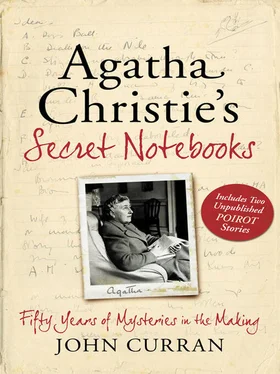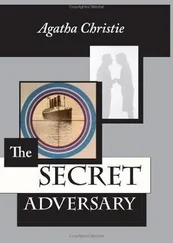‘You and your colleague.’
They started for France two days later. Poirot, Mr Higgs, and a slim young man, in a checked suit and a bright pink shirt, who was a highly successful cat burglar.
ix
It was not Hercule Poirot’s custom to indulge in activities in his proper person, but for once he broke through his rule. It was past one in the morning when, shivering slightly in spite of his overcoat, he was laboriously hoisted to the top of a wall by the help of his two assistants.
Mr Higgs prepared to drop from the wall into the grounds inside. There was a violent baying of a dog and suddenly an enormous creature rushed out from under the trees. [11] Such is the political flavour, the eponymous Hound is almost forgotten and he plays a much smaller role than his counterpart in the collected story.
Hercule Poirot ejaculated:
‘Mon Dieu, but it is a monster! Are you sure—?’
Mr Higgs patted his pocket with complete assurance.
‘Don’t you worry, guv’nor. What I’ve got here is the right stuff. Any dog’ll follow me to hell for it.’
‘In this case,’ murmured Hercule Poirot, ‘he has to follow you out of hell.’
‘Same thing,’ said Mr Higgs, and dropped off the wall into the garden.
They heard his voice.
‘Here you are, Fido. Have a sniff of this…That’s right. You come along of me…’
His voice died away into the night. The garden was dark and peaceful. The slim young man assisted Poirot down from the wall. [12] In the course of this story we see a different Poirot, one who longs for the company of a woman, drinks vodka and now climbs over a wall, although this is a feat he has already performed in the course of the eleventh Labour, ‘The Apples of the Hesperides’. Indeed, the tracking down and eventual discovery of August Hertzlein is reminiscent of a similar procedure involving the Cellini chalice in that story.
They came to the house. Poirot said:
‘That is the window there, the second to the left.’
The young man nodded. He examined the wall first, smiled in satisfaction over a convenient pipe, and then easily and seemingly without effort he disappeared up the wall. Presently, very faintly, Poirot heard the sound of a file being used on the barred window.
Time passed. Then something dropped at Poirot’s feet. It was the end of a silk ladder. Someone was coming down the ladder. A short man with a bullet head and a little dark moustache.
He came down slowly and clumsily. At last he reached the ground. Hercule Poirot stepped forward into the moonlight.
He said politely:
‘ Herr Hertzlein, I presume.’
x
Hertzlein said:
‘How did you find me?’
They were in the compartment of a second class sleeper bound for Paris.
Poirot, as was his fashion, answered the question meticulously.
He said:
‘At Geneva, I became acquainted with a gentleman called Lutzmann. It was his son who was supposed to have fired the shot that killed you and as a result young Lutzmann was torn to death by the crowd. His father, however, was firmly convinced that his son had never fired that shot. It seemed therefore as though Herr Hertzlein had been shot by one of the two men who were on either side of Lutzmann and that the pistol was forced into his hand and those two men had fallen upon him at once crying out that he was the murderer. But there was another point. Lutzmann assured me that in these mass meetings the front ranks were always packed with ardent supporters—that is to say by thoroughly trustworthy persons.
‘Now the Central Empire administration is very good. Its organisation is so perfect that it seemed incredible that such a disaster could have occurred. Moreover there were two small but significant points. Hertzlein, at the critical moment, came out from his bulletproof shelter and his voice had sounded different that evening. Appearance is nothing. It would be easy for someone to carry out an impersonation on a public platform—but the subtle intonation of a voice is a thing more difficult to copy. That evening Herr Hertzlein’s voice had lacked its usual intoxicating quality. It was hardly noticed because he was shot only a very few minutes after he had started to speak.
‘Suppose, then, that it was not Herr Hertzlein speaking, and consequently not Herr Hertzlein who had been shot? Could there be a theory that would account for those very extraordinary happenings?
‘I thought that that was possible. Amongst all the various rumours that circulate in a time of stress, there is usually a foundation of truth beneath at least one of them. Supposing that that rumour was true that declared that Hertzlein had lately fallen under the influence of that fervent preacher, Father Ludwig.’
Poirot went on, speaking slowly:
‘I thought it possible, Excellency, that you, a man of ideals, a visionary, might have come suddenly to realise that a new vista, a vista of peace and brotherhood, was open to humanity, and that you were the man to set their feet upon that path.’
Hertzlein nodded violently. He said in his soft husky thrilling voice:
‘You are right. The scales fell from my eyes. Father Ludwig was the appointed means to show me my true destiny. Peace! Peace is what the world wants. We must lead youth forward to live in brotherhood. The youth of the world must join together, to plan a great campaign, a campaign of peace. And I shall lead them! I am the means appointed by God to give peace to the world!’
The compelling voice ceased. Hercule Poirot nodded to himself, registering with interest his own aroused emotion.
He went on drily:
‘Unfortunately, Excellency, this vast project of yours did not please certain executive authorities in the Central Empires. On the contrary it filled them with dismay.’
‘Because they knew that where I led, the people would follow.’
‘Exactly. So they kidnapped you without more ado. But they were then in a dilemma. If they gave out that you were dead, awkward questions might arise. Too many people would be in the secret. And also, with you dead, the warlike emotions you had aroused might die with you. They hit instead upon a spectacular end. A man was prevailed upon to represent you at the Monster meeting.’
‘Perhaps Schwartz. He took my place sometimes in public processions.’
‘Possibly. He himself had no idea of the end planned for him. He thought only that he was to read a speech because you yourself were ill. He was instructed at a given moment to step out from the bulletproof shelter—to show how completely he trusted his people. He never suspected any danger. But the two storm troopers had their orders. One of them shot him and the two of them fell on the young man standing between them and cried out that it was his hand that had fired the shot. They knew their crowd psychology.
‘The result was as they had hoped. A frenzy of national patriotism and a rigid adherence to the programme of force by arms!’
Hertzlein said:
‘But you still do not tell me how you found me?’
Hercule Poirot smiled.
‘That was easy—for a person, that is, of my mental capacity! Granted that they had not killed you (and I did not think that they could kill you. Someday you might be useful to them alive, especially if they could prevail upon you to readopt your former views). Where could they take you? Out of the Central Empires—but not too far—and there was only one place where you could be safely hidden—in an asylum or a mental home—the place where a man might declare tirelessly all day and all night that he was Herr Hertzlein and where such a statement would be accepted as quite natural. Paranoics are always convinced that they are great men. In every mental institution there are Napoleons, Hertzleins, Julius Caesars—often many examples of le bon Dieu himself!
Читать дальше
Конец ознакомительного отрывка
Купить книгу












